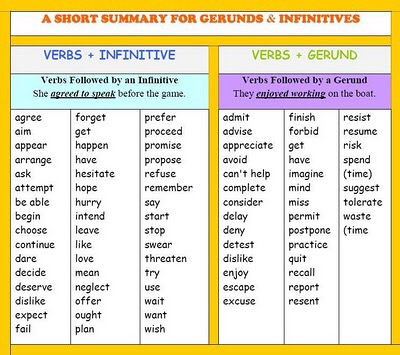
La parte facil
Se utiliza el infintivo…
1. Para hablar de un objetivo o el porqué hacemos algo:
We pay the gardener to do the garden.
1. Después de adjetivos:
It was very intelligent to think of that.
Se utiliza el gerundio…
1. Después de las preposiciones:
I’m very unhappy about paying extra.
2. Si el verbo es el sujeto de una frase:
Playing football is my favourite hobby.
La parte dificil
Muchas veces usamos dos verbos juntos…
- I fancy eating some chocolate – Me apetece comer algo de chocolate.
- I want to eat some chocolate – Quiero comer chocolate.
En estos ejemplos usamos el verbo “eat” pero en el primero va en gerundio (termina en ING) y en el segundo ejemplo va en infinitivo (“TO” mas el verbo).
¿Por qué la diferencia?
Simplemente hay algunos verbos que van con el segundo verbo en gerundio y algunos verbos que van con el infinitivo, y otros en que se puede utilizar un infinitivo o un gerundio pero con un cambio de significado.
No hay ninguna norma. HAY QUE APRENDERSE LA LISTA Y YA ESTA. Así que – adelante…
Hay una canción que nos muestra un vivo ejemplo. Esta canción es de Fleetwood Mac… You make loving fun. (Tu haces que amar sea divertido). En esta canción seria imposible utilizar el infinitivo.
Verbos seguidos por el infinitivo en inglés:
Agree, aim, ask, decline, demand, fail, hesitate, hope, hurry, manage, offer, plan, prepare, refuse, want, wish.
Verbos seguidos por el gerundio en ingles:
Admit, avoid , consider , delay , deny, detest , dread, envisage, feel, detest , dread, envisage, feel, like, finish, imagine, miss, make, recall, resent, risk, suggest.
Verbos que pueden llevar un infinitivo y un gerundio.
1. Come + inf = al final.
They came to accept their dog’s death.
Come + ing = describir movimiento.
They came running up to me.
2. Go on + infinitive: indicar lo que pasó despues de que un pèriodo de tiempo se acabó.
After graduating, he went on to win a gold medal.
Go on + ing: seguir.
He went on running.
3. Mean + inf – para hablar de lo que queríamos hacer.
I didn’t mean to hurt you mum.
Mean + ing – hablar de lo que supone un acción o propuesta. O los resultados de una acción.
If having a tattoo means hurting my mum, I’ll never do it.
4. Regret + inf: expresar que lamentas algo que ha ocurrido.
I regret taking my hamster on the bus.
Regret + ing: se usa en cartas para expresar malas noticias en una manera formal y simpática.
I regret to inform you that you’re pet hamster passed away.
5. Remember + ing – recordar a alguien.
Remember to take the rubbish out.
Remember + ing – Recordar algo (una memoria).
I remember taking the rubbish out.
6. Stop + inf: para hablar de una acción que paro para dejar otra accion occure.
He stopped to phone his mum.
Stop + ing: Para hablar del fin de una acción.
When he stopped phoning his mum, she stopped sending him the money.
7. Try + inf – para intentar realizar un deseo o acción.
He tried to call Jennifer Lopez but she was out.
Try + ing – para probar posibilidades antes de elegir o hacer otra cosa.
He tried calling Jennifer on his mobile, then on his land line.

Ejercicio: infinitivo o gerundio en inglés
Hay que añadir ‘to’ o ‘ing’ a un verbo adecuado. No te olvides… este tipo de ejercicio no es suficiente para asimilar un tema así… hay que escribir una frase con cada uso por lo menos diez veces.
1. We all hoped _________________________ the lottery. We didn’t.
2. I’d planned _________________________ a new house.
3. He finished _________________________ down the address and gave it to me.
4. The president agreed _________________________ the contract and the Saudis were happy.
5. The chairman prepared _________________________ his speech while the audience trickled in.
6. Biko refused _________________________ apartheid.
7. The Muslims resented _________________________ to live under crusader rule.
8. Joey suggested _________________________ our sex life.
9. I don’t recall _________________________ him to the party, but he came anyway.
10. My daughter dreads _________________________ to the dentists.
11. Nobody will agree _________________________ the rules.
12. If the Americans invaded Australia I wouldn’t hesitate _________________________ arms.
13. If Marriane feels _________________________ an e-mail would be too informal, she can call.
14. Most Australians dread_________________________ warm beer.
15. The kangaroos hurried _________________________ the river.
Respuestas al ejercicio
1. to win.
2. to buy /build
3. writing
4. to sign
5. to give /deliver
6. to accept
7. having
8. improving
9. inviting
10. going
11. to follow
12. to take up
13. writing
14. drinking
15. to cross

5 Comments
Hola candy!
si te fijas bien podras ver que tienes un pequeño fallo y es que has puesto al principio:Se utiliza el infintivo…
1. Después de las preposiciones:
I’m very unhappy about paying extra.
2. Si el verbo es el sujeto de una frase:
Playing football is my favourite hobby.
Y NO ES EL INFINITIVO ES EL GERUNDIO
Hola candy!
si te fijas bien podras ver que tienes un pequeño fallo y es que has puesto al principio:se utiliza el infinitivo en : despues de una preposicion …………..
Y NO ES EL INFINITIVO ES EL GERUNDIO
Thanks for informing us, Jenny xoxo
Hola candy!
si te fijas bien podras ver que tienes un pequeño fallo y es que has puesto al principio:que con las preposiciones se utiliza el infinitivo Y NO ES EL INFINITIVO ES EL GERUNDIO
gracias por el aporte candy, muy bien la explicación, ese fallo corregido.
Por cierto eres muy guapa:)